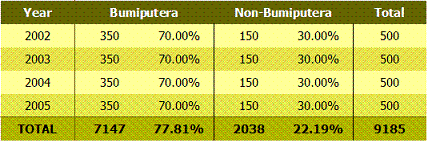As reported in the New Straits Times (NST) on 23rd May:
The Education Ministry announced on Wednesday that Malaysian students will soon be allowed to attend international schools, doing away with the former stringent enrolment criteria.In a separate article, the NST went so far as to claim that the change in policy is a "seismic shift". The rationale for the liberalisation of the international school policy appears to be to:
For a start, more Malaysian students will be able to attend international schools: They could constitute up to 40 per cent of the enrolment of each school. At present, only 0.05 per cent of Malaysian students receive their education in the 32 international schools in the country.
1. Stopping the brain drain of the country's best and brightest.Frankly speaking, I do not think that the rationale hold up too much water. The impact on both reversing brain drain as well as promoting Malaysia as a regional education hub is likely to be very minimal, hardly justifying the prominence in which NST gave the Minister of Education in its coverage.
Several thousand young Malaysians leave the country every year for primary and secondary education in Singapore, Australia and Britain. A number opted for foreign education after having their requests to attend international schools locally turned down.
2. Promoting Malaysia as a regional education hub.
In the past, many brand-name international schools were not keen to set up branches or campuses in Malaysia because of strict enrolment criteria for Malaysians. They feared that they may not be able to obtain the volume of students needed. A more liberal policy may encourage top foreign schools to consider Malaysia a lucrative location.
However, I do think that the liberalisation of enrolment into international schools is not a bad thing. Different parents will have different priorities for their children and hence, all parents should have the right to pick their choice of school(s). As it is, we already have the Chinese and Indian vernacular schools, the Islamic religious schools, the government funded national schools as well as the few private schools based on the national curriculum. Adding international schools to the mix will just enhance the choices available for the Malaysian parents.
While there may be arguments that international schools may further jeopardise the atractiveness of national schools and aggravating the segregation of the rich and the poor, I believe that the actual and tangible impact on the above concerns are minimal.
The attractiveness of national schools is challenged mostly by the vernacular and religious schools. It can only be resolved if the national schools are able to deliver education at an acceptable quality. Furthermore the number of students expected to attend the international schools are likely to be very small. These students may be sent overseas anyway, if they fail to secure a place at a local international school. In addition, the wealthy should not be penalised from their choice of education, just because they are rich.
Parents were also interviewed with regards to their decision to send their children to these schools.
Eileen, a product of Assunta Secondary School in Petaling Jaya, said she wanted Lawrence [her son] to be exposed to international culture from a young age. "We wanted to groom him properly from young to learn about international relations and not to have a culture shock later in life," she saidThe Star also carried an article on Sunday on a couple who sent their 2 sons to an international school in order to better "adapt" to an overseas education at a later stage.
So how much does an education at an international school cost? It cost Eileen an estimated RM10,000 to RM12,000 per child, per year at the school. Well, what Eileen is paying for her children's education appears comparatively cheap other international schools. Alice Smith International School charges "a cool RM40,000 per annum per child".
And that is not all. Besides tuition, there is an initial outlay of about RM20,000 which includes registration fees, miscellaneous payments and a refundable deposit. This is the equivalent of the cost of a Master's degree programme in local universities, with registration fees included.The principal of Alice Smith, Nik Bishop justifies the fees with "top class facilities and excellent teachers... Such quality comes with a premium".
So back to the question, will I send my own daughter, Xin Ying to an international school (assuming I can afford it!)?
The answer is simply, no, for 2 reasons:
- As a Malaysian, and fully expecting Xin Ying to remain one (until such a time she can make up her own mind :)), I'd like her to receive at the very least a Malaysian primary education. She needs to spend time mixing with Malaysians first, instead of with foreigners of a different culture. She can do her own "mixing" with foreigners at a later age should she get herself a scholarship to pursue her studies overseas. :)
- While the international schools may indeed have better facilities, the student population is defined not so much by ability, but by wealth. I'd much rather Xin Ying attends a local top primary or secondary school than an international school. And given that many of the Malaysians who have qualified (and graduated) from some of the top colleges in the world originated from the local education system, I'm confident that if she is able get into these top colleges, she'll get there whether through the local or international schools.

